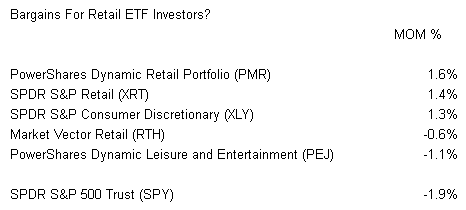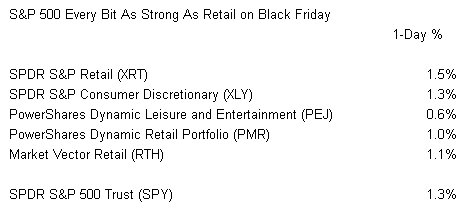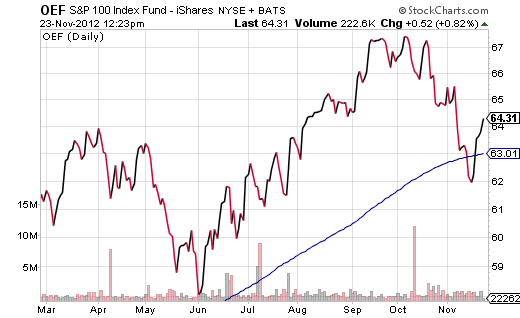Holy Home Depot (HD), Target (TGT) and eBay (EBAY)! The volume of e-mail offers from traditional and non-traditional retailers this Black Friday has thoroughly overwhelmed my smart phone. (It’s not a genius phone… that’s for certain.)
Yet, for all the hoopla surrounding “day-after deals,” investors may want to resist the hype. Bespoke researchers have found that, since 2000, S&P 500 retail stocks have averaged a 0.8% gain from Thanksgiving day through the Christmas holiday. In contrast, the broader S&P 500 has averaged nearly twice that amount (1.4%).
Should ETF advocates looking to cash in on retail stock enthusiasm rethink consumption assumptions? Or will the combination of Charcoal Gray Thursday and dot-com bargain hunting change the pattern of the prior decade? My sense is that the pattern will remain the same.
Consider the mainstream media’s effect on investor emotionality. The publicity began in grand style with countless stories regarding discounters opening their doors early. Similarly, the National Retail Federation expressed that it expected holiday season sales to surge 4.1%. Meanwhile, Wal-Mart put out a release for what it described as its “best ever” series of sales promotions. And Macy’s went out of its way to talk about its record crowds at its flagship New York location.
All of that “info” would seem very bullish for the retail sector, wouldn’t it? On the other hand, most of these expectations were previously priced in by Retail ETFs during the month leading up to the season.
To illustrate the point, I compiled a list of the most popular retail-related ETFs alongside their month-over-month percentage returns. Granted, the prior month for all stock assets had been plagued by fiscal cliff fears. Nevertheless, it’s not difficult to see that Retail ETFs held the relative performance edge over the heralded large-cap U.S. stock universe.
Momentum investors might look at these results and conclude that retailers are the place to profit for several more months… or at least shelter against tense congressional negotiations. If history is any guide, though, Retail ETFs are likely to fade a bit in the final month of 2012.
Simon Colvin, an analyst at market-data firm Markit, has identified that short-seller interest in the retail space is currently much larger than that of the S&P 500 as a whole. In other words, there’s plenty of money betting on price declines in consumer stock “faves.”
I wouldn’t describe the retail stock investing environment as sickly, especially with individual names like JC Penney and Best Buy rocketing 1.6% as I type. That’s double the broader market. Nevertheless, if “retail” were going to outperform in the next few months, rather than underperform, one would certainly anticipate outperformance during the Black Friday trading session.
Notice the relative flatness… even some relative weakness… in the table below. If Retail ETFs were going to buck the historical trends since 2000, why aren’t the Black Friday percentage gains decidedly more impressive than the S&P 500 at large?
By no means am I endeavoring to slam Retail ETFs here. In fact, I happen to think the equal weighting between consumer defensive and consumer discretionary in Market Vector Retail (RTH) is a reasonably low-risk way to gain access to steady increases in consumption.
If you’re not in the market for a complementary portfolio asset, however, you may be better served by adding to your core. Funds like iShares S&P 100 (OEF) as well as iShares Russell 1000 (IWB) have recovered their respective trendlines. And if historical trends through the Christmas season hold, they will provide better returns with greater diversification than the above-mentioned competition.
Disclosure: Gary Gordon, MS, CFP is the president of Pacific Park Financial, Inc., a Registered Investment Adviser with the SEC. Gary Gordon, Pacific Park Financial, Inc, and/or its clients may hold positions in the ETFs, mutual funds, and/or any investment asset mentioned above. The commentary does not constitute individualized investment advice. The opinions offered herein are not personalized recommendations to buy, sell or hold securities. At times, issuers of exchange-traded products compensate Pacific Park Financial, Inc. or its subsidiaries for advertising at the ETF Expert web site. ETF Expert content is created independently of any advertising relationships.
Which stock should you buy in your very next trade?
AI computing powers are changing the stock market. Investing.com's ProPicks AI includes 6 winning stock portfolios chosen by our advanced AI. In 2024 alone, ProPicks AI identified 2 stocks that surged over 150%, 4 additional stocks that leaped over 30%, and 3 more that climbed over 25%. Which stock will be the next to soar?
Unlock ProPicks AI